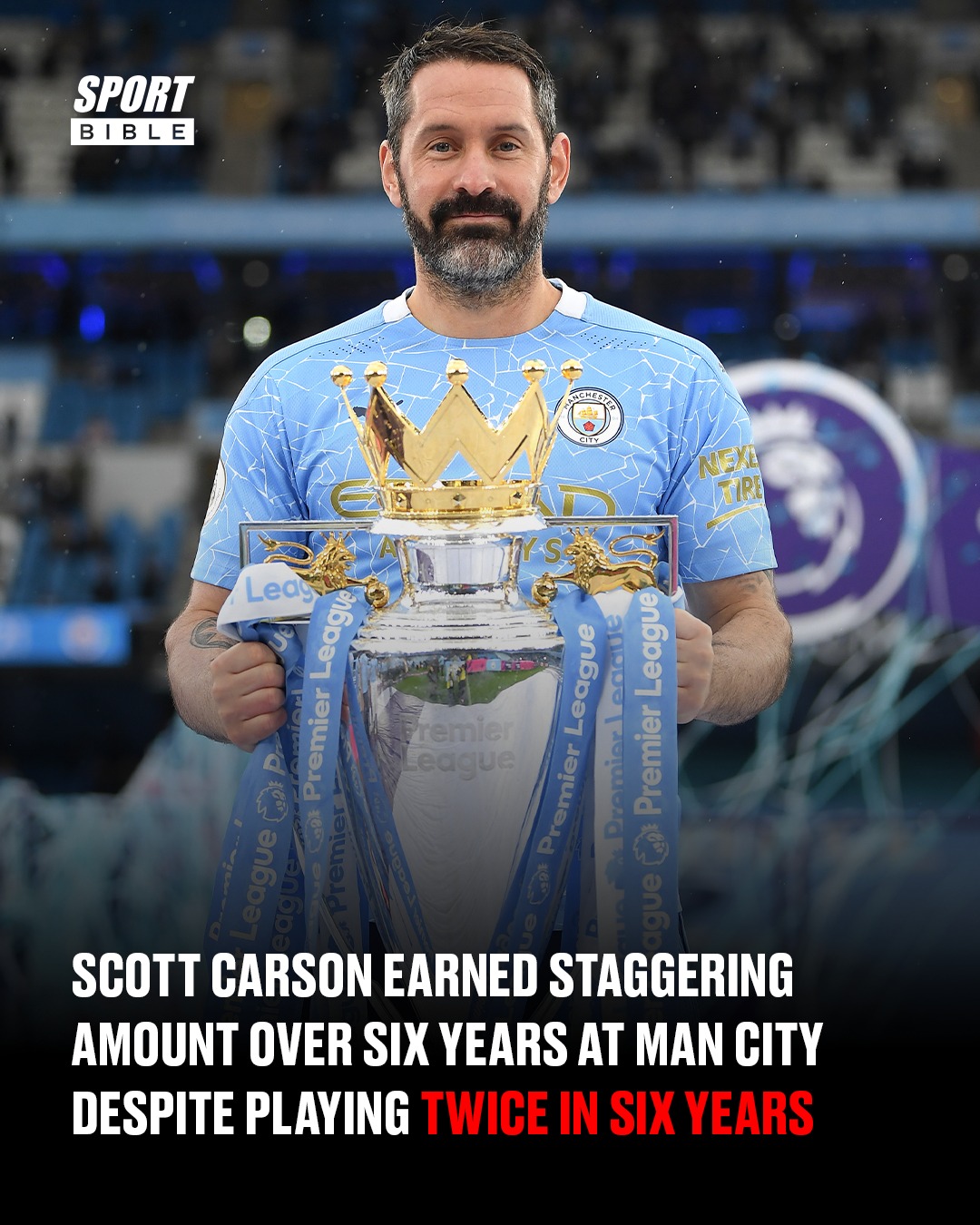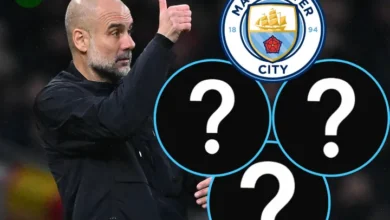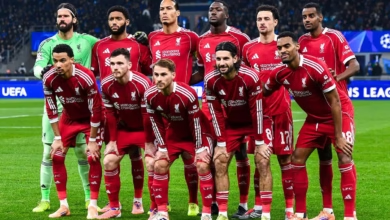Scott Carson earned staggering amount over six years at Man City but made just one league appearance

In the annals of football history, few stories capture the beautiful absurdity of the modern game quite like Scott Carson’s six-year stint at Manchester City. When the veteran goalkeeper finally departed the Etihad Stadium in June 2025, he left behind a legacy that defied conventional logic: eleven major trophies, two appearances, 108 minutes of football, and approximately £7 million in earnings. It’s a tale that perfectly encapsulates both the financial excesses of elite football and the often-overlooked human elements that contribute to championship success.
From Promising Prospect to Journeyman
Scott Carson’s journey to becoming Manchester City’s most celebrated bench-warmer began long before his arrival at the Etihad. Born in Whitehaven, Cumbria, in 1985, Carson showed early promise as a goalkeeper, quickly rising through the youth ranks at Leeds United. His potential was evident from the start – tall, athletic, with excellent reflexes and commanding presence in the box that marked him as a future England international.
His professional debut came in 2003 with Leeds United, during one of the most turbulent periods in the club’s history. As Leeds faced financial meltdown and relegation from the Premier League, Carson represented one of the few bright spots in an otherwise dark chapter. His performances between the posts were mature beyond his years, displaying the kind of composure and shot-stopping ability that would soon attract attention from England’s biggest clubs.
The move to Liverpool in 2005 seemed like the natural progression for a goalkeeper of Carson’s caliber. Anfield had always been a place where promising British talent could develop, and Carson arrived with expectations of eventually challenging for the number one spot. While his time at Liverpool was limited in terms of first-team appearances, he was part of the squad that achieved Champions League glory in 2005, giving him his first taste of European success – a precursor to the trophy-laden years that would follow much later in his career.
However, the path of a goalkeeper’s career is rarely straightforward. Unlike outfield players who might find opportunities across various positions, goalkeepers face the unique challenge of competing for a single spot in the starting eleven. This reality led Carson on a journey that would take him through several clubs including West Bromwich Albion, Wigan Athletic, and Derby County, each stop adding layers to his experience and understanding of the professional game.
The Unexpected Call from Manchester
In 2019, as Carson approached his mid-thirties, few would have predicted that his most successful period lay ahead. Playing for Derby County in the Championship, he had settled into the role of a reliable, experienced keeper helping to stabilize a club with its own financial challenges. It was during this period that Manchester City came calling, not with an offer of first-team football, but with something far more unusual – a role as third-choice goalkeeper.
The circumstances surrounding Carson’s arrival at City reveal much about the modern game’s approach to squad building. Pep Guardiola, known for his meticulous attention to detail, had identified a need not just for goalkeeping depth, but for a particular type of character in the dressing room. At 34, Carson brought something that couldn’t be quantified in save percentages or distribution statistics – experience, wisdom, and the kind of unflappable personality that helps maintain squad harmony during the pressure-cooker environment of elite football.
The initial loan deal from Derby was structured to benefit all parties. City paid instalments of approximately £500,000 twice yearly, covering both the loan fee and Carson’s wages of £25,000 per week. For Derby, struggling financially, it provided much-needed cash flow. For Carson, it offered the opportunity to train at one of the world’s most advanced football facilities and learn from one of the game’s greatest coaches. For City, it solved the problem of having adequate cover while adding a stabilizing influence to their squad.
The Role of the Modern Third-Choice Goalkeeper
Carson’s position at Manchester City illuminates a often-misunderstood aspect of modern football squad dynamics. The role of a third-choice goalkeeper extends far beyond simply being ready to play if needed. In an era where squads train intensively almost every day, having experienced players who can provide quality opposition in training sessions is invaluable. Carson’s role involved regularly facing some of the world’s best attackers in practice, helping them stay sharp while maintaining his own fitness levels.
More importantly, Carson became what football insiders often term a “dressing room leader” – someone whose influence extends beyond their playing contributions. Pep Guardiola’s praise of Carson as “very important behind the scenes” and his observation that “people listen when he speaks” reveals the goalkeeper’s true value to the organization. In a squad filled with international superstars, many of whom were still young and adjusting to the pressures of elite football, Carson provided a steady, calming presence.
This mentoring aspect became particularly valuable for City’s primary goalkeeper, Ederson. Despite being one of the world’s best keepers, Ederson was still relatively young when Carson arrived, and having an experienced English goalkeeper to discuss the nuances of Premier League football proved invaluable. The relationship between Carson and Ederson exemplified how modern football success often depends on contributions that never appear in match statistics.
Two Games, Maximum Impact
Carson’s competitive appearances for Manchester City, while limited, were carefully chosen moments that demonstrated the club’s trust in his abilities. His Premier League debut came in May 2021, in what was essentially a celebration match following City’s title victory. The 4-3 win over Newcastle United at St. James’ Park provided Carson with his first top-flight appearance in nearly a decade, and despite conceding three goals, he managed to save a penalty – albeit with Joe Willock converting the rebound.
The choice to give Carson this opportunity was significant beyond the mere rotation of players. It represented Guardiola’s recognition of Carson’s contributions throughout the season and served as a reward for his professionalism and positive influence on the squad. For a manager known for his tactical perfectionism, the decision to trust Carson in a Premier League match spoke volumes about the goalkeeper’s preparation and reliability.
Carson’s second and final appearance came in the Champions League, during the second leg of a last-16 tie against Sporting CP. With City leading 5-0 on aggregate, Carson was introduced for the final 17 minutes, allowing him to experience European football at the highest level. His performance was solid, making an impressive save from Paulinho and maintaining a clean sheet. While the circumstances were comfortable for City, Carson’s composure in such a high-profile match demonstrated why he had earned the trust of his teammates and coaching staff.
The Trophy Cabinet Phenomenon
Perhaps no statistic better encapsulates the unique nature of Carson’s Manchester City career than his trophy-to-playing-time ratio. Over his six years at the club, Carson accumulated an astonishing eleven major trophies: four Premier League titles, one Champions League, two League Cups, two Community Shields, the Club World Cup, and the UEFA Super Cup. This haul, achieved across just 108 minutes of competitive football, created the remarkable statistic of one trophy every 9.8 minutes of playing time.
This phenomenon sparked considerable debate among football fans and analysts. Some viewed it as emblematic of what’s wrong with modern football – a player earning millions and collecting trophies without contributing meaningfully on the pitch. Others saw it as genius, recognizing that Carson’s contributions extended far beyond his playing time and that his role in maintaining squad harmony was invaluable to City’s success.
The truth, as often happens in football, lies somewhere between these extremes. Carson’s trophy collection reflects the reality of modern squad football, where success depends on contributions from players who may never see significant game time. The mental and physical preparation required to be ready at any moment, the professionalism needed to maintain standards despite lack of opportunities, and the positive influence required to support teammates – these are all crucial elements that Carson provided throughout his City tenure.
Financial Rewards and Market Realities
Carson’s financial compensation during his time at Manchester City reflected both his experience and the club’s valuation of his contributions. Starting at £25,000 per week on his initial loan deal, his salary increased to £30,000 per week (£1.56 million annually) when he signed permanently in 2022. Over his six years at the club, Carson earned approximately £7 million, creating the eye-catching calculation of roughly £65,000 per minute of competitive football.
While these figures might seem excessive for limited playing time, they must be understood within the context of modern football economics. Elite clubs like Manchester City operate with wage budgets exceeding £300 million annually, making Carson’s salary a relatively small investment in squad stability and depth. Moreover, the value he provided in training sessions, mentoring younger players, and maintaining squad morale cannot be easily quantified but was clearly deemed worthwhile by the club’s leadership.
The financial aspect of Carson’s story also highlights broader trends in football, where experienced players are often valued as much for their character and influence as for their on-field contributions. In an industry where one disruptive personality can undermine team chemistry, investing in players who enhance squad dynamics makes sound business sense.
Cultural Impact and Social Media Phenomenon
Carson’s unique situation at Manchester City made him something of a cult figure among football fans, particularly on social media. His trophy haul relative to playing time became a frequent topic of discussion, memes, and debate across various platforms. The juxtaposition of his limited game time with his extensive medal collection perfectly captured the absurdist humor that football fans often embrace.
The social media response to Carson’s departure and career statistics revealed the polarized nature of modern football discourse. Comments ranged from calling him “the biggest fraud in football history” to celebrating him as a “genius” who had “gamed the system.” Others simply marveled at the statistical anomaly he represented, with one fan noting he was “the most decorated player to never play.”
This cultural phenomenon extended beyond simple statistics. Carson became a symbol of the changing nature of professional football, where traditional measures of success – goals scored, saves made, matches played – may not fully capture a player’s value to their team. His story resonated with fans because it challenged conventional thinking about merit and reward in professional sports.
The Mentor’s Influence
One of the most significant but least visible aspects of Carson’s Manchester City career was his role as a mentor and stabilizing influence within the squad. In modern football, where young players often earn substantial salaries and face intense pressure from an early age, having experienced professionals who can provide guidance and perspective is invaluable.
Carson’s influence extended beyond goalkeeping matters. His career journey – from promising youngster to Champions League winner with Liverpool, through various clubs and experiences, to unexpected success at City – provided him with a unique perspective on football’s ups and downs. This experience made him an invaluable resource for younger players dealing with the pressures and uncertainties of elite football.
Txiki Begiristain, Manchester City’s Director of Football, specifically credited Carson’s impact on younger squad members, highlighting how his experience and approach influenced the development of players who would go on to achieve significant success. This mentoring role, while difficult to measure statistically, represents one of the most meaningful aspects of Carson’s contribution to City’s sustained success.
Legacy and Departure
As Carson’s contract expired in June 2025, Manchester City faced the task of replacing not just a goalkeeper, but a unique personality who had become integral to their squad dynamics. Reports suggested that the club was targeting Chelsea’s Marcus Bettinelli as a replacement, indicating their intention to maintain the same approach of having an experienced, homegrown goalkeeper in a similar role.
Carson’s departure marked the end of one of the most unusual and fascinating careers in modern football. His story challenges conventional notions of success and contribution in professional sports, highlighting how value can be created and measured in ways that traditional statistics might not capture.
The debate surrounding Carson’s career – whether his trophy collection represents an embarrassment or stroke of genius – misses the broader point about modern football’s complexity. His success reflects a sophisticated understanding of what it takes to build and maintain a championship-winning culture, where every squad member plays a role, regardless of their time on the pitch.
Conclusion: Redefining Success
Scott Carson’s Manchester City career stands as a testament to the evolving nature of professional football and the multiple ways players can contribute to team success. While his 108 minutes of competitive football and eleven major trophies create a statistic that seems almost fictional, the reality of his contribution was far more nuanced and valuable than simple numbers might suggest.
His story reminds us that in team sports, success is rarely the result of individual brilliance alone but rather the product of countless interactions, preparations, and contributions that may never be visible to the public. Carson’s professionalism, experience, and positive influence helped create an environment where Manchester City could achieve sustained excellence, making him a legitimate part of their historic success.
As football continues to evolve, with squads growing larger and roles becoming more specialized, Scott Carson’s career may well be remembered as ahead of its time rather than an anomaly. His ability to find value and purpose in a non-traditional role, while maintaining the highest professional standards, offers lessons that extend far beyond football.
In the end, Carson’s legacy at Manchester City transcends statistics and trophies. He represented the human elements that make football a team sport – loyalty, professionalism, mentorship, and the understanding that success often depends on contributions that may never appear in the headlines but are essential to the story nonetheless. His six-year journey from Derby County loanee to Champions League winner may be unusual, but it perfectly captures the beautiful unpredictability that makes football the world’s most beloved sport.















